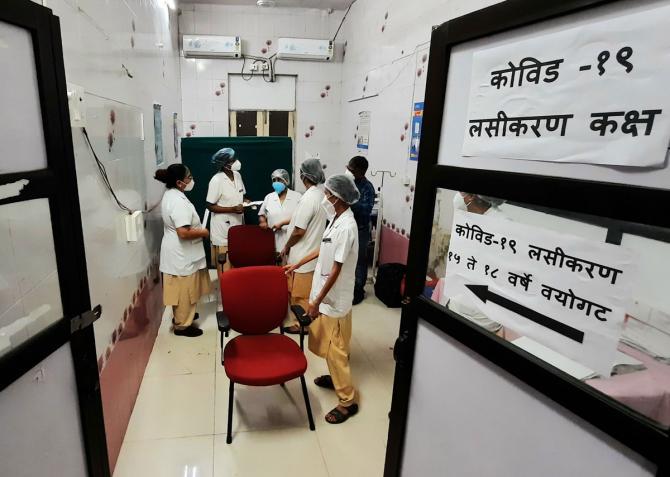Maharashtra on Sunday reported 11,877 fresh COVID-19 cases, 2,707 more than the day before, and 50 Omicron infections, the state health department said in a bulletin.

The state also reported nine deaths.
Of the 11,877 cases, 7,792 are from Mumbai, the bulletin said.
However, as per the Mumbai civic body, the number of new cases is 8,063.
On Saturday, Maharashtra had reported 9,170 COVID-19 cases.
Of the 50 Omicron infections, 36 are from Pune Municipal Corporation areas, eight from Pimpri Chinchwad Municipal Corporation limits, two each from Pune rural and Sangli, and one each from Mumbai and Thane.
The state has reported 510 such cases so far of which 193 patients recovered.
Delhi records 3,194 new Covid cases, positivity rate jumps to 4.59%
The national capital on Sunday reported 3,194 Covid cases, the highest single-day rise since May 20, as the positivity rate rose to 4.59 per cent, according to data shared by Delhi's health department.
The city also reported one death due to the disease. Sunday's tally of coronavirus cases was 17 per cent higher than the 2,716 infections registered a day before.
If the positivity rate is over five per cent for two consecutive days it would trigger a 'red alert' under the Delhi Disaster Management Authority-approved Graded Response Action Plan (GRAP) leading to a 'total curfew' and halting of most economic activities.
Delhi had reported 3,231 cases on May 20 last year with a positivity rate of 5.50 per cent. As many as 233 deaths were recorded on that day.
On Friday and Thursday, 1,796 and 1,313 cases were recorded with a positivity rate of 1.73 per cent and 2.44 per cent respectively, according to official figures. The daily case tally on Wednesday, Tuesday and Monday were 923, 496 and 331, respectively.
The huge spike in fresh cases in the last few days in Delhi is being recorded amid a significant jump in cases of the new Omicron variant of coronavirus in the city.
The death toll due to coronavirus in the city has risen to 25,109.
The number of cumulative cases on Sunday stood at 14,54,121.
Over 14.19 lakh patients have recovered from the infection.
Nine COVID-19 deaths were reported in the city in December last year, and seven in November, according to official data. Delhi had recorded four Covid deaths in October and five in September.
A total of 69650 tests -- 59,897 RT-PCR tests -- were conducted the previous day, the bulletin said.
According to the Sunday bulletin, of the 9,024 dedicated Covid beds in Delhi's hospitals, only 307 were occupied, including by suspected cases. Of the 238 Covid patients in hospitals, 94 need oxygen and four are on ventilator support.
Delhi Chief Minister Arvind Kejriwal on Sunday said though the city is witnessing a sharp spike in the number of daily cases and active cases of coronavirus, there is no need to panic as most patients are asymptomatic or have very mild symptoms and do not need hospitalisation.
He presented data to show that despite an increase in the number of COVID-19 cases, oxygen bed occupancy is less than one per cent in hospitals and is very low as compared to the deadly second wave of coronavirus in April last year.
"Currently, the number of active cases in the city is 6,360 and today (Sunday) 3,100 new cases are expected to be reported. All cases are mild and most of them don't need hospitalisation," the chief minister said in a virtual press conference.
Active COVID-19 cases rose from about 2,000 on December 29, 2021, to 6,000 on January 1, but the number of patients in hospitals dipped during this period. On December 29, as many as 262 beds were occupied while on January 1 it was 247, he said.
"I am presenting this data to show that the coronavirus cases at present are very mild and there is no need to panic. We have to act responsibly, wear masks, wash hands regularly and follow social distancing norms," Kejriwal said.
On December 28, the DDMA declared a 'yellow alert' under the GRAP amid a spike in Covid cases following the emergence of the coronavirus' Omicron variant.
A day later, it decided that Covid-related curbs under the "yellow alert" would continue and the authorities would monitor the situation for a while before deciding on fresh restrictions.
According to GRAP, the Yellow or Level 1 alert kicks in if the case positivity rate crosses 0.5 per cent for two consecutive days or cumulative daily positive cases (seven-day rolling average) cross 1,500 or average oxygenated bed occupancy (seven-day average) is above 500.
The Amber or Level 2 alert is imposed if the case positivity is more than 1 per cent for two consecutive days, or cumulative daily average cases are 3,500 or if bed occupancy is over 700.
Level 3 (Orange) and Level 4 (Red) alerts can be considered if the positivity rate is over 2 per cent and 5 per cent respectively. Other criteria for level 3 and level 4 alerts are 9,000 and 16,000 cumulative daily cases and 1,000 and 3,000 occupied beds respectively.










